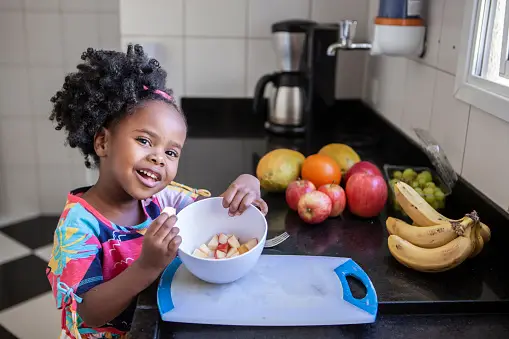Picky eating is normal for most toddlers. It’s simply another step in growing and becoming independent. As long as your child is healthy, growing normally, and has plenty of energy, they will most likely get the necessary nutrients.
Don’t blame yourself for their little aversion to food. Rome wasn’t built in a day. They’ll pull through. Follow our short guide on coping with a picky eater.
Reasons your toddler is a picky eater
Mama, making nutritious and sumptuous meals for your toddler is frustrating for them to reject them. Picky eating isn’t an acquired trait. It gradually develops due to many factors. Some of them include:
- Neglecting your toddler: In Nigeria, where picky eating isn’t taken lightly, the problem sometimes stems from the parents. Understand your toddler is still growing. They may not be familiar with several meals. If they like a particular meal, make it for them. You can also incorporate fruits and vegetables so they don’t notice.
- Underdeveloped taste buds: This is common for children who struggle to withdraw from breast milk. They hardly like most meal that doesn’t taste like what they know. When weaning your baby, incorporate solid meals gradually.
- Too much carbs during pregnancy: The pregnancy craving can be wild. Try to cut down on processed and junk food with poor nutrition. Your baby’s taste sensation may be poor due to the lack of variety in your diet during pregnancy.
- Nutrient deficiency: Children lacking in basic nutrients like vitamin C, iron, calcium, and magnesium have poor appetite for food. They are picky eaters and often prefer unhealthy meals.
- Food texture: Your child may refuse a portion of food based on a certain colour or texture. For example, they could refuse foods that are red or green, contain seeds, or are squishy.
5 tips for coping with a picky eater
Your child’s picky eating is temporary. It will usually end before school age if you don’t make it a big deal. Try the following strategies to help you positively deal with your child’s picky eating behaviour.
- Don’t force a meal or a snack on your child, and don’t bribe them to eat certain foods or clean their plate. This might ignite a struggle over food. Also, your child may experience anxiety or become less sensitive to hunger. Serve small portions to avoid overwhelming your child, allowing them to independently ask for more.
- Serve meals and snacks at the same time daily. Diversify their meal. Give them options. If they choose not to eat a meal, regular snack time will allow them to eat nutritious foods. But you have to be careful because allowing your child to fill up on juice, milk, and snacks will reduce their appetite for meals.
- Be patient with new foods. Encourage your child to discuss a food’s colour, shape, aroma, and texture. Serve new foods with your child’s favourite foods. Keep serving your child healthy choices until they become familiar and preferred.
- Be a good role model. Try the new foods yourself to describe their taste, texture and smell to your child.
- Make it fun!!! Serve veggies with a favourite sauce or side dish. Cutting cookies into different shapes and sizes will make your child anticipate meals. Serve a variety of brightly coloured fruits.
- Let your child assist you while shopping for fruits, vegetables and other healthy foods. Don’t buy anything you don’t want your child to eat. At home, encourage your child to help you rinse the veggies and set the table.
- Minimise distractions by putting off the television and any other gadget during meals. This would help them focus on eating. Television ads can encourage your child to love sugary, less nutritious foods.
Things to avoid when dealing with a picky eater
- Juggling food down their throat
Never turn them over and juggle food down their throat during meal time. They tend to have an aversion to food. It’s never going to last forever.
- Don’t yell or beat your toddler
While it’s annoying, don’t yell or beat your toddler. They get scared and throw up their meals. Don’t build fear in them. Lighten the mood by playing with their food!
- Preparing food they don’t like
As much as you want them to eat your way, your way isn’t the best sometimes. Prepare meals they like more often with a twist. You can hide in vegetables by grinding or crushing them inside.
Mama, a balanced diet is essential for the growth and development of every child. Consuming a particular set of meals is rather unhealthy. Dealing with a picky eater is tough, but you must be patient. They won’t wake up the next day and love everything you want for them. Be patient with them, mama. You got this!










Comments